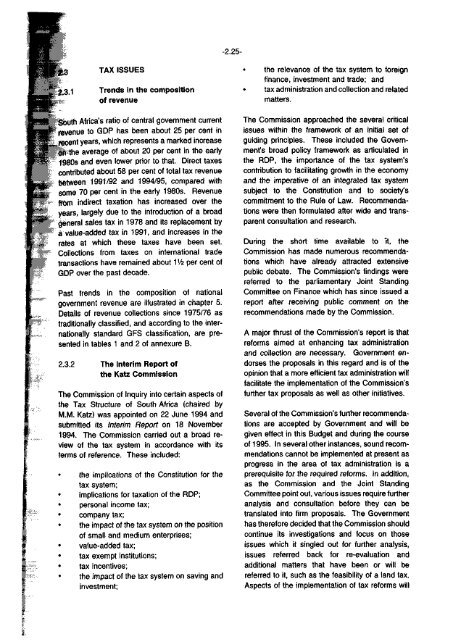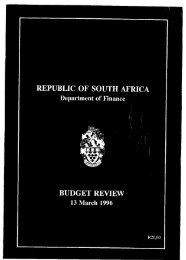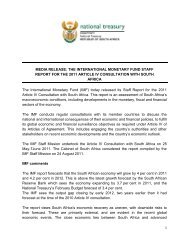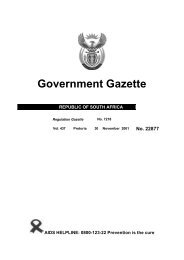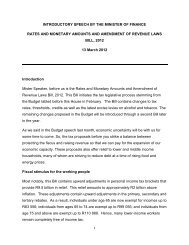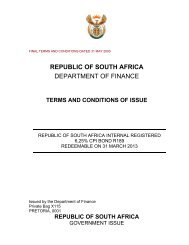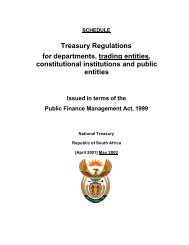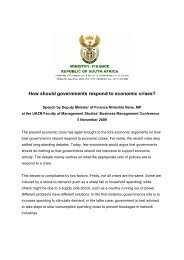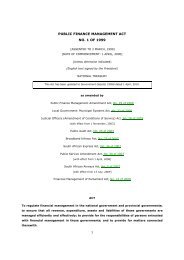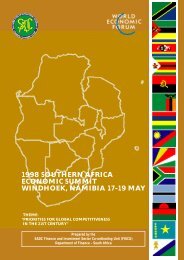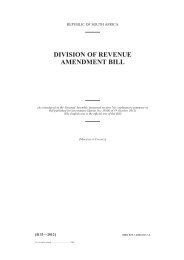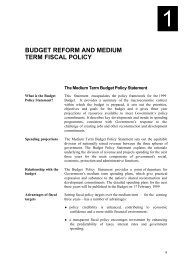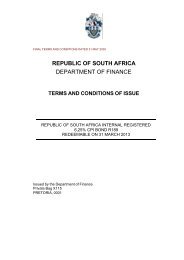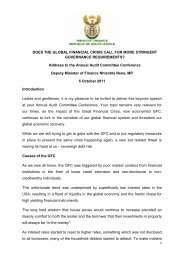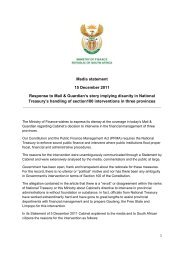1995 - National Treasury
1995 - National Treasury
1995 - National Treasury
You also want an ePaper? Increase the reach of your titles
YUMPU automatically turns print PDFs into web optimized ePapers that Google loves.
-2.25-<br />
2.3 TAX ISSUES<br />
2.3.1 Trends in the composition<br />
of revenue<br />
South Africa's ratio of central government current<br />
revenue to GDP has been about 25 per cent in<br />
recent years, which represents a marked increase<br />
on the average of about 20 per cent in the early<br />
1980s and even lower prior to that. Direct taxes<br />
contributed about 58 per cent of total tax revenue<br />
between 1991/92 and 1994/95, compared with<br />
some 70 per cent in the early 1980s. Revenue<br />
from indirect taxation has increased over the<br />
year.;, largely due to the introduction of a broad<br />
general sales tax in 1978 and its replacement by<br />
a vaue-added tax in 1991, and increases in the<br />
rates at which these taxes have been set.<br />
Collections from taxes on international trade<br />
transactions have remained about 1 1 /2 per cent of<br />
GDP over the past decade.<br />
Past trends in the composition of national<br />
government revenue are illustrated in chapter 5.<br />
Details of revenue collections since 1975/76 as<br />
traditionally classified, and according to the internationally<br />
standard GFS classification, are presented<br />
in tables 1 and 2 of annexure B.<br />
2.3.2 The Interim Report of<br />
the Katz Commission<br />
The Commission of Inquiry into certain aspects of<br />
the Tax Structure of South Africa (chaired by<br />
M.M. Katz) was appointed on 22 June 1994 and<br />
submitted its Interim Report on 18 November<br />
1994. The Commission carried out a broad review<br />
of the tax system in accordance with its<br />
terms of reference. These included:<br />
the implications of the Constitution for the<br />
tax system;<br />
• implications for taxation of the RDP;<br />
• personal income tax;<br />
• company tax;<br />
• the impact of the tax system on the position<br />
of small and medium enterprises;<br />
• value-added tax;<br />
• tax exempt institutions;<br />
• tax incentives;<br />
the impact of the tax system on saving and<br />
investment;<br />
• the relevance of the tax system to foreign<br />
finance, investment and trade; and<br />
tax administration and collection and related<br />
matters.<br />
The Commission approached the several critical<br />
issues within the framework of an initial set of<br />
guiding principles. These included the Government's<br />
broad policy framework as articulated in<br />
the RDP, the importance of the tax system's<br />
contribution to facilitating growth in the economy<br />
and the imperative of an integrated tax system<br />
subject to the Constitution and to society's<br />
commitment to the Rule of Law. Recommendations<br />
were then formulated after wide and transparent<br />
consultation and research.<br />
During the short time available to It, the<br />
Commission has made numerous recommendations<br />
which have already attracted extensive<br />
public debate. The Commission's findings were<br />
referred to the parliamentary Joint Standing<br />
Committee on Finance which has since issued a<br />
report after receiving public comment on the<br />
recommendations made by the Commission.<br />
A major thrust of the Commission's report is that<br />
reforms aimed at enhancing tax administration<br />
and collection are necessary. Government endorses<br />
the proposals in this regard and is of the<br />
opinion that a more efficient tax administration will<br />
facilitate the implementation of the Commission's<br />
further tax proposals as well as other initiatives.<br />
Several of the Commission's further recommendations<br />
are accepted by Government and will be<br />
given effect in this Budget and during the course<br />
of <strong>1995</strong>. In several other instances, sound recommendations<br />
cannot be implemented at present as<br />
progress in the area of tax administration is a<br />
prerequisite for the required reforms. In addition,<br />
as the Commission and the Joint Standing<br />
Committee point out, various issues require further<br />
analysis and consultation before they can be<br />
translated into firm proposals. The Government<br />
has therefore decided that the Commission should<br />
continue its investigations and focus on those<br />
issues which it singled out for further analysis,<br />
issues referred back for re-evaluation and<br />
additional matters that have been or will be<br />
referred to it, such as the feasibility of a land tax.<br />
Aspects of the implementation of tax reforms will


